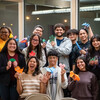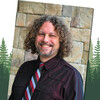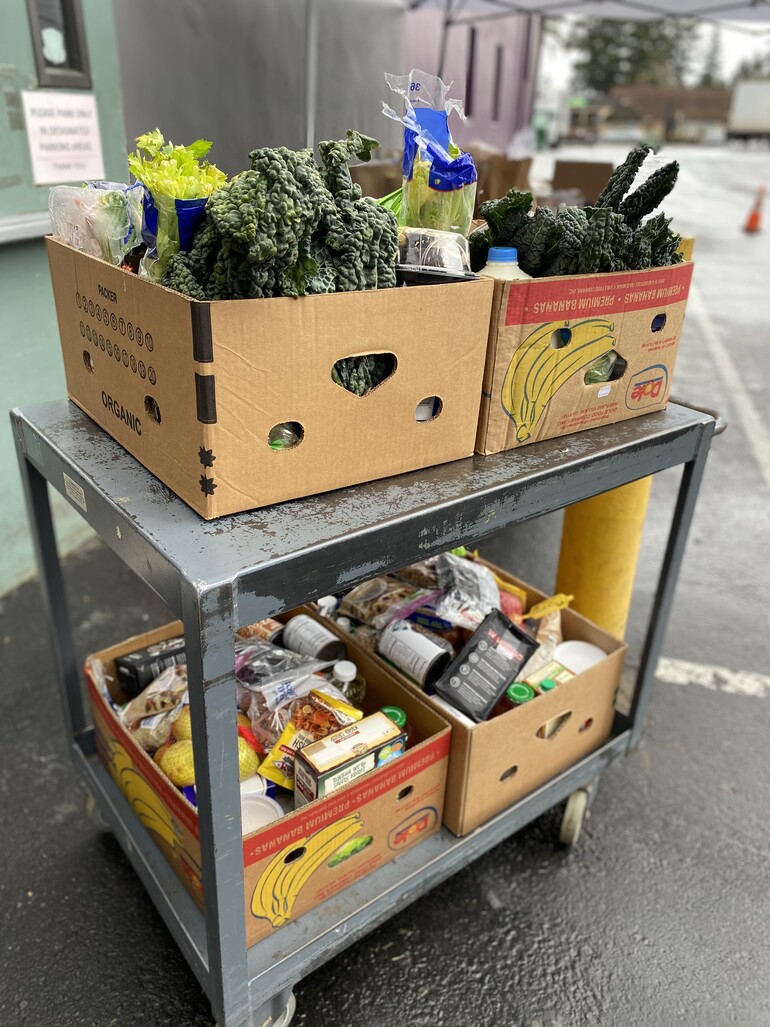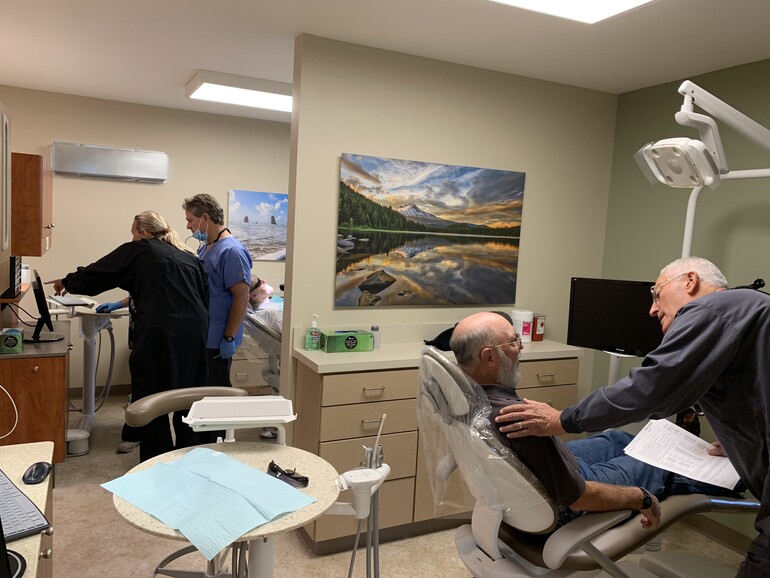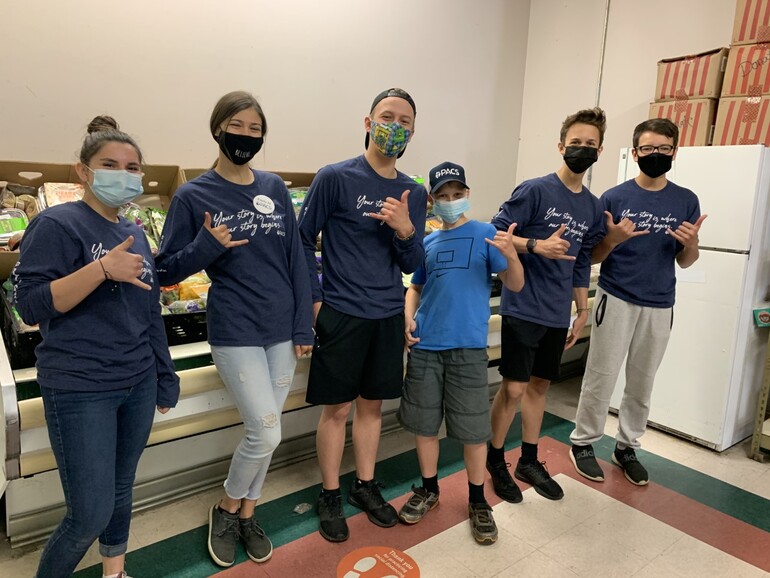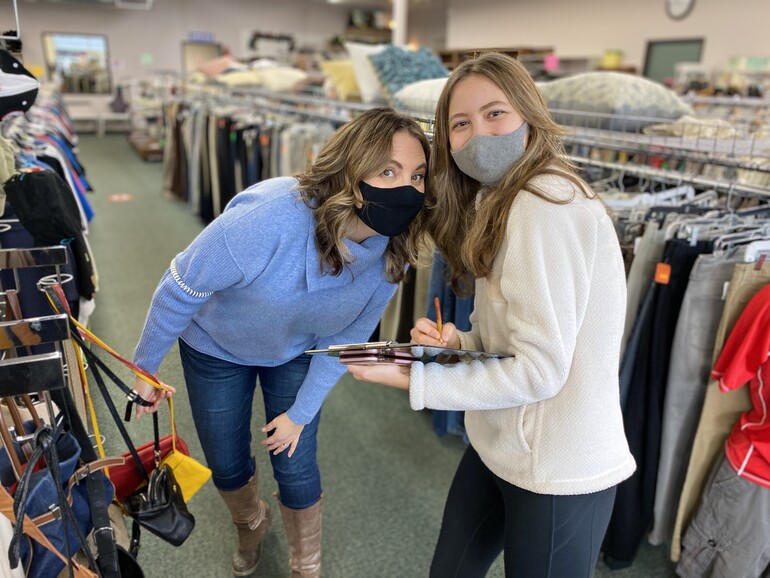Every weekday morning, a line of cars assembles quietly in the Portland Adventist Community Services' parking lot. Even though PACS opens at 9:00, the first cars usually arrive between 8:15 and 8:30. They're the veteran clients who know how long lines grow as the clock ticks on.
Volunteers and staff have already been hard at work since 7:30, stocking the food pantry shelves and pricing thrift store items to sell. Still other volunteers drive refrigerated box trucks all over Portland to pick up donated food from grocery stores and bakeries. The intake coordinator, Traci, zigzags between waiting cars, taking down information and making small talk. She greets many by name. Sometimes they come bearing gifts of homemade food or an invitation to their child's wedding.
As the clock strikes nine o-clock, the first car is waved forward and greeted. A volunteer notes how many family members live in the client's home and loads the appropriate food boxes into their vehicle. Inside, is a bucket brigade of volunteers and staff. Carts are pushed around a horseshoe-shaped room filled from floor to ceiling with shelves stacked to overflowing with shelf-stable groceries. In the middle, a row of freezers and refrigerators hold meat, dairy, frozen food and salad ingredients. As the carts make their way around the room, boxes begin to filling and nearly overflowing. The air hums with activity and conversation as people of all ages work together to fill orders before the line of cars spills out onto the main road.
Across the parking lot, another line starts to form at the thrift donation station. Trucks drop off garbage bags full of clothes, furniture and other home goods. Thrift store volunteers and staff are in a constant race with limited space to sort items and move them out onto the floor before the processing room becomes a maze of boxes and bags.
The thrift store doors are unlocked and customers trickle in, fishing through racks for the bargain deals all thrifters crave. It feels familiar, regular and routine. Yet, just a few short months ago, it was anything but.
Before the COVID-19 pandemic hit, PACS looked different. Clients entered the building to shop for their groceries rather than waiting in their cars for a box. Shoppers packed in closely without occupancy limits or social distancing. The newly opened Gateway Grace Dental Clinic was beginning to bustle with a stream of patients coming to recieve low-cost preventive care.
Things changed quickly as hospitals filled with emergency cots to accommodate patient overflow and state officials closed non-essential businesses. The Dental Clinic couldn't afford the protective equipment required to keep volunteer staff safe. They had to close. The thrift store, a neighborhood hub and economic engine for PACS, was closed for two full months. Most of the PACS staff headed home without any idea when they would be back. As demand for food skyrocketed, a skeleton crew struggled to run the food pantry while COVID precautions completely overhauled their process.
Amid the chaos of change and uncertainty, the Portland community came together to support PACS. Volunteers risked their safety to keep essential services running while donors increased their generosity to keep PACS financially viable. Local businesses reached out to keep the food pantry generously stocked with food. The store manager began posting items online, allowing shoppers to spot deals from the safety of their own homes. Executive leadership started working with consultants and community leaders to create a safe and sustainable reopening plan for the dental clinic. Soon, the whole team was back to work.
Even through the many hurdles and uncertainty of 2020 and 2021, miracles were abundant. As service industry workers struggled to make ends meet, PACS provided over 2.1 million pounds of groceries to over 65,700 people, free of charge. For perspective, 2.1 million pounds is a little over the total weight of 36 Statues of Liberty! Thanks to hundreds of people putting their faith into action and showing up when it mattered most, PACS not only survived, it thrived.
How can I help my community?
Want to get involved in your community as PACS has? Here are some tips to help maximize your impact.
Look for people to join forces with
Relationships matter in the community service world. Through combined effort of network foodbanks, PACS can turn $11 into three days' worth of quality food for a family of four. That kind of financial efficiency comes from dozens of working relationships built over decades of work with the Oregon Food Bank, grocery store chains and many other businesses and nonprofits. Do your research and find out who in your community already has the connections to make your time and money stretch.
Get to know your knowledge resources
It's not always easy to spot the most significant needs in your community, especially if you've been fortunate enough to live a relatively privileged life. However, knowing who has their finger on the community's pulse and asking them about the greatest needs, will have you up to speed in no time. Public school counselors, local law enforcement, city government and other local nonprofits are all great places to start.
Stay close to home
Step outside the front door of your church or place of business and walk ten minutes in any direction. Odds are, you'll find problems to address. Don't drive past needs in your neighborhood to serve on the far side of town; you are far more likely to stay active and engaged in projects that don't involve a commute.
Don't underestimate the power of financial donations
Volunteering is deeply satisfying because you're right there in the trenches watching lives change. Donating money can feel comparatively less impactful, but remember that established charities can stretch your dollars farther than you might imagine. Don't feel bad if it's all you're able to do right now; your financial gifts are incredibly vital.
Share Jesus
When Christ volunteered in a community, He took care of the basic needs first by healing the sick and feeding the hungry. He showed that He had their immediate best interests at heart, unlike other religious officials who were out of touch and aloof. When we follow Christ's example, the focus becomes less about guiding our neighbors to heaven and more about bringing a little heaven to them.

